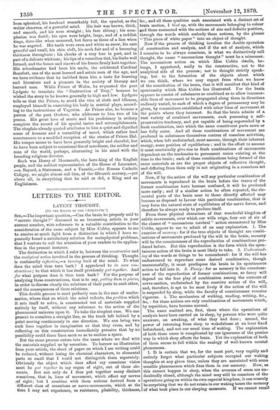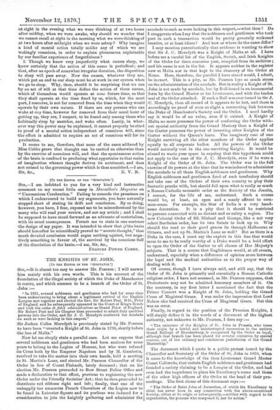LETTERS TO THE EDITOR-
LATENT THOUGHT.
[TO TELE EDITOR. OF THE " SPEOTATOR.1
Sat,—The important question,—Can the brain be properly said to "secrete thought ?" discussed in an interesting article in your current number, with reference to a valuable contribution to the consideration of the same subject by Miss Cobbe, appears to me to receive so much light from a distinction in which I have re- peatedly found a satisfactory solution for metaphysical problems, that I venture to call the attention of your readers to its applica- tion in the present instance.
The distinction to which I refer is, between the constructive and the analytical action involved in the process of thinking. Thought is confessedly reflective,—a turning back of the mind. To what does the mind thus turn back ? I apprehend to its own con- structions ; to that which it has itself previously put together. And for what purpose does it thus turn back ? For the purpose of analyzing these constructions, that is to say, pulling them to pieces, in order to discuss clearly the relations of their parts to each other, and the consequences of these relations.
This double process is most perfectly seen in the case of mathe- matics, where that on which the mind reflects, the problem which it sets itself to solve, is constructed out of materials supplied entirely by itself, without any reference to the action of the phenomenal universe upon it. To take the simplest case. We can present to ourselves a straight line, as the track left behind by a point moving continuously in one direction. We can bring two such lines together in imagination so that they cross, and by reflecting on this construction immediately perceive that by no possibility could these lines meet so as to enclose a space.
But the same process enters into the cases where we deal with the materials supplied us by sensation. To borrow an illustration from your article, the sheet of paper on which I am writing could be reduced, without losing its chemical characters, to elemental parts so small that I could not distinguish them separately. Obviously the object which does affect my conscious vision must be put together in my organ of sight, out of these ele- ments. But not only do I thus put together many distinct sensations, that is, lines of movement, which affect my nerves ,.c.1 sight ; but I combine with them notions derived from a different class of sensations or nerve-movements, which at the time I may not experience, as resistance, pliability, thickness, &c., and all these qualities each associated with a distinct set of brain motion, I bind up, with the movements belonging to colour end those connected with the notions of size and definite position, through the words which embody these notions, by the phrase "This piece of white paper" into an object of thought.
Now if the process of thinking involves the double operation. of construction and analysis, and if the act of analysis, which,
I conceive to be always conscious, is what we distinctively call thought, the name "unconscious thought" must be a misnomer._ The unconscious action on which Miss Cobbe dwells, be- longs, I apprehend, really to the constructive, not to the' analytical aide of the process ; not to thought strictly speak- ing, but to the formation of the objects about which.
we can think, where we may expect from what we know-
of the constitution of the brain, that it will manifest that kind of spontaneity which Miss Cobbe has illustrated. For the brain, appears to consist of substances so combined as to allow innumer-
able lines of movement to be propagated along them in directions endlessly varied, to each of which a degree of permanency may be' given, by connections established with other lines of movement at the points where they intersect. So that the brain admits of
vast variety of combined movements, each possessing a self- preservative tendency, and yet capable of being superseded by a
fresh combination, into which the same constituent parts more or- less fully enter. And all these combinations of movement are produced in substances themselves centres of ceaseless activities, which, when left undisturbed, must assume, through their inherent. energy, some position of equilibrium ; and in the effort to assume it must continually give rise to fresh combinations of movements. dependent on the tendencies to permanent union existing at the time in the brain ; each of these combinations being formed of the- same materials as are the proper objects of reflective thought,. and differing from them only in not originating in a conscious act of the will.
Now, if by the action of the will any particular combination or movements is reproduced in the brain before the traces of the former combination have become confused, it will be produced more easily ; and if a similar action be often repeated, the ele- mental parts of the brain near to those directly affected mar become so disposed to favour this particular combination, that it may form the natural state of equilibrium of the nerve forces, anct therefore be always ready to produce itself.
From these physical characters of that wonderful kingdom of subtle movements, over which our wills reign, four out of six of the classes of "unconscious cerebral" action enumerated by Miss Cobbe, appear to me to admit of an easy explanation. 1. The exercise of memory: for if the true objects of thought are combi-- nations of movements produced by the will in the brain, memory will be the consciousness of the reproduction of combinations pro-- duced before. But this reproduction is the form which the spon-
taneous action of the brain is most likely to take. 2. Understand- ing of the words or things to be remembered : for if the will has- endeavoured to reproduce some desired combination, though unsuccessfully, it must predispose the brain in its spontaneous. action to fall into it. 3. Fancy : for as memory is the conscious-
ness of the reproduction of former combinations, so fancy will depend on the free play of combination among the currents of' nerve-motion, undisturbed by the coercive action of the will,. and, therefore, is apt to be most lively if the action of the will, is suspended by sleep, while the faculty of consciousness remains. vigorous. 4. The mechanism of walking, reading, writing, &c., &c, : for these actions are only combinations of movements which,. by repetition, have become normal.
The cases omitted are, first, those where the operations of analysis have been carried on in sleep, by persons who were quite unaware, on awaking, of what they had done ; second, the- power of returning from sleep to wakefulness at an hour fixed. beforehand, and not our usual time of waking. The explanation of both these cases is complicated by our ignorance of the precise' way in which sleep affects the brain. Yet the explanation of both. of them seems to fall within the analogy of well-known mentaL phenomena.
1. It is certain that we, for the most part, very rapidly and entirely forget what particular subjects occupied our waking thoughts at any given time, unless they are associated with some sensible phenomenon which fixes them in our memory. Now, aa- this cannot happen in sleep, when the avenues of sense are un- doubtedly closed, although the mind may still be conscious of the operations going on within its own especial kingdom, it can scarcely be surprising that we do not retain in our waking hours the memory of what took place in our sleeping moments. If we cannot recall
at eight in the evening what we were thinking of at two hours -after midday, when we were awake, why should we wonder that we cannot recall at eight in the morning what we were thinking of at two hours after midnight when we were asleep ? Why imagine a kind of mental action totally unlike any of which we are wakingly conscious, in order to explain phenomena explainable by our familiar experience of forgetfulness ?
2. Though we know very Imperfectly what causes sleep, we know certainly that the action of this cause is periodical ; and that, after an epoch of somewhat irregular duration, the disposition to sleep will pass away. Now the causes, whatever they are, 'which put an end to our sleep must be at work in our system when we go to sleep. Why, then, should it be surprising that we can by an act of will at that time define the action of these causes, which of themselves would operate at some future time, so that -they shall operate at the time fixed by us, which, for the most cart, I conceive, is not far removed from the time when they would -operate by their own nature. If there are any persons who can wake at any time, however far removed from their usual hour of ;getting up, they are, I suspect, to be found only among those who 'habitually sleep by snatches, and wake often. Lastly, in what- -ever way this power may be explained, it cannot properly be cited in proof of a mental action independent of conscious will, since -the effect is admitted to require an act of conscious will for its production.
It seems to me, therefore, that none of the cases adduced by Miss Cobbe prove that thought can be carried on otherwise than by the exercise of conscious will, and that the spontaneous action of the brain is confined to producing what appertains to that realm -of imagination whence thought derives its nutriment, and does aot extend to the governing power which is thus nourished.—I am,



































 Previous page
Previous page